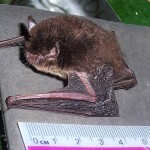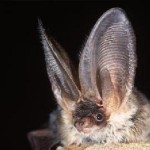
Flies caught in the act are at risk of becoming a bat's dinner, particularly if they're being noisy. Image: Current Biology
The buzzing of wings during mating lures in hungry bats.
They might not moan in ecstasy, but the sounds flies make during copulation can lead to a violent death, attracting predator bats to their love nests while their defences are down. Researchers at Max Planck Institute for Ornithology, Germany, demonstrate that wild Natterer’s bats (Myotis nattereri) eavesdrop on acoustic cues emanating from mating flies (Musca domestica).
“We knew that the Natterer’s bats’ diet contains a very high proportion of diurnal flies,” says Stefan Greif of the Max Planck Institute for Ornithology. “At night, these flies sit on, for example, vegetation and are pretty much “˜invisible’ to the echolocation system of the bats. So how do they end up in a bat’s stomach?”
The researchers video-recorded the movements of 9,000 houseflies over four years in a cowshed in Marburg, Germany. While the flies weren’t in flight mode they were fairly inconspicuous to the bats, as they were never attacked while walking across the ceiling. However, as soon two flies engaged in copulation their risk of being attacked by a bat rose by a huge 26 per cent.
“When mating, the flies utter a burst of broadband, click-like signals, likely from the male’s wing-fluttering,” Greif says. “That buzzing sound apparently gives the flies away to bats, which are otherwise completely unable to detect the insects where they sit on cluttered ceilings.”
To be sure the mating sounds were the reason the bats were lured to their fly meals, the researchers mounted dead (and noiseless) fly pairs in a typical sex-act position on the shed ceiling. Since bats never attacked the dead flies, the researchers concluded that the bats were definitely attracted to the sexual noises, rather than the other possibility of being drawn in by the increased surface area the two flies would have reflected during echolocation.
Researchers suspect that other animals experience the same risk factors during or after sexual intercourse. “Many animals are not only conspicuous in being vocal during sex, but they are also distracted in their attention,” Grief says. “We now show that one of the proposed mechanisms — being more conspicuous — is giving the prey away to predators and increase predation risk.”
To discover how copulation can be physically burdensome to cephalopods, click here.
Natterer’s bat catching a pair of copulating flies (black circle) from the cowshed ceiling and a Natterer’s bat attacking an ultrasonic loudspeaker that plays fly copulation buzzes in the cowshed. Video: Siemers et al., Current Biology Volume 22 Issue 14






